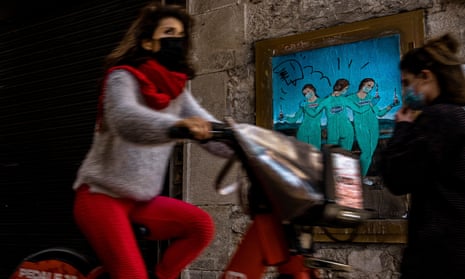Efforts by Chinese authorities to change the narrative around Covid-19’s origins have reignited on social media this week after a government spokesperson revived a conspiracy theory that it came from a US army lab, Helen Davidson reports from Taipei.
Brazil records 1,340 deaths – as it happened
This blog is now closed. We’ve launched a new blog at the link below:
Wed 20 Jan 2021 18.52 EST
First published on Tue 19 Jan 2021 18.33 EST- Summary
- Dubai cancels non-essential surgery as Covid-19 cases surge
- Summary
- France reports 26,784 new Covid cases, highest since November
- Spain logs record number of new Covid infections
- New record daily death toll in the UK
- Italy considers legal action over Pfizer vaccine delivery delays
- Two cases in China resemble more infectious strain first seen in UK
- France issues warning over use of homemade masks against new variants
- Dutch government to introduce contentious nationwide curfew - reports
- More Australian Open players test positive
- US CDC has administered 15.7m vaccines
- Summary
- Japan’s vaccine programme chief denies reports of May roll-out
- Sadiq Khan: London missed out on early share of vaccine
- UK coronavirus strain detected in at least 60 countries: WHO
- North Korean defector numbers plunge amid pandemic
- Beijing steps up Covid measures
- Mexico suffers record deaths
- China reports 103 new cases
- Joe Biden holds memorial for 400,000 Americans who have died of Covid-19
- Germany extends partial lockdown
- UK suffers record daily Covid deaths
- Summary

Live feed
- Summary
- Dubai cancels non-essential surgery as Covid-19 cases surge
- Summary
- France reports 26,784 new Covid cases, highest since November
- Spain logs record number of new Covid infections
- New record daily death toll in the UK
- Italy considers legal action over Pfizer vaccine delivery delays
- Two cases in China resemble more infectious strain first seen in UK
- France issues warning over use of homemade masks against new variants
- Dutch government to introduce contentious nationwide curfew - reports
- More Australian Open players test positive
- US CDC has administered 15.7m vaccines
- Summary
- Japan’s vaccine programme chief denies reports of May roll-out
- Sadiq Khan: London missed out on early share of vaccine
- UK coronavirus strain detected in at least 60 countries: WHO
- North Korean defector numbers plunge amid pandemic
- Beijing steps up Covid measures
- Mexico suffers record deaths
- China reports 103 new cases
- Joe Biden holds memorial for 400,000 Americans who have died of Covid-19
- Germany extends partial lockdown
- UK suffers record daily Covid deaths
- Summary
Two cases in China resemble more infectious strain first seen in UK

Two Daxing cases reported on 17 January were analysed and are considered to be highly similar to the new, more transmissible strain of the virus that began spreading in Britain, Pang Xinghuo, deputy director of Beijing’s Center for Disease Control and Prevention, told a news conference on Wednesday.
The two cases have no genetic association with previous local and imported cases in Beijing, nor to recent local cases in other Chinese regions, Pang said, adding the source of infection was initially determined to be from overseas, according to Reuters.
See earlier posts about China’s health authorities ramping up anti-pandemic measures in response to its ongoing outbreak.

The German government’s decision to introduce the obligatory wearing of high-filtration medical masks, instead of fabric masks as has been the norm since early on in the pandemic, has prompted an inevitable scramble for them, amid fears of escalating prices, their affordability for those on low incomes, and fakes.
So-called FFP1, 2 or 3 masks (FFP stands for filtering face piece) and the thinner, paper masks often donned in operating theatres must now be worn in the workplace, on public transport and in shops, Angela Merkel announced yesterday evening, in response to experts’ advice that cloth face coverings do not offer sufficient protection from the more virulent mutations of the disease.
The decision follows the introduction of a medical mask rule in the southern state of Bavaria on Monday.
The over-60s and those with chronic, pre-existing health conditions are to receive vouchers in the post from their health insurers, towards buying masks in pharmacies. Employees who cannot keep a distance of 1.5 metres from colleagues must be provided with the masks by their employers, the government has said.
Earlier this week, the Robert Koch Institute, the government’s disease control agency, said that 16 cases of the so-called British variant, B117, had so far been detected in Germany.
Most of the cases were of people who had arrived from the UK. But at least three cases have since been detected in Berliners suffering from coronavirus who had not travelled for months, all of whom are being treated in hospital.
These samples were tested on 8 January and lead virologists to believe that the mutation from Britain has been circulating in the city for some time and may be more widespread in Germany than previously thought.
But due to the lack of gene sequencing that has so far been carried out in Germany, it was widely suspected that this mutation and others, such as the so-called South African variant, and one from Brazil, were likely more prevalent.
Gene sequencing was being carried out in Germany on only around one in 900 samples of the virus derived from positive test results until very recently.
But Jens Spahn, the health minister, announced in the past week that sequencing was immediately being increased to be carried out on 5% of positive test results in future, a figure he said might sound low but that if done in a targeted way, was efficient enough to track new mutations and their development.
Israel has included pregnant women among those getting priority access to Covid vaccines, seeing no risk to them or their foetuses, a senior public health official said on Wednesday.
“Today we are recommending that pregnant women, mainly those with high morbidity risk factors, get the vaccine,” Nachman Ash, the national coordinator on the pandemic, told public broadcaster Kan radio. “We have put them on the priority list.”
It came after the hospitalisation this week of several pregnant women with Covid complications amid surging contagions, Reuters reports.
Read my colleague Peter Beaumont’s story on how a surge in infections has dampened optimism over country’s advanced immunisation programme.
The Netherlands will ban flights from non-Schengen countries, including Britain and South Africa, from 23 January to curb infections of the new, more infectious coronavirus variants, Dutch news agency ANP reported on Wednesday (see earlier posts).
The flight ban, which the prime minister Mark Rutte said also will apply to all South American countries, will begin on Saturday.
“This is a very tough measure, but we are at a crossroads,” Rutte said in a televised news conference. “The British variant doesn’t leave us with an alternative.”
The UK’s medicine regulator will be ready and able to approve new versions of Covid vaccines designed to counter any future variants that may emerge, Boris Johnson said on Wednesday.
Asked if the government would develop a new rapid pathway to allow approvals of new versions of vaccines to protect against such variants, the prime minister confirmed:
Yes indeed … we’ve been talking about that with the scientists over the last days and weeks intensively, just in the last few hours … We’re confident that the (medicine regulator) MHRA will be in a position to turn around new applications for new variants of vaccines, as may be required to deal with new variants of the virus.

The threat of the B117 coronavirus mutation first discovered in Britain taking hold in Germany was a key factor behind the government decision to increase the length and scale of lockdown measures, Angela Merkel has said.
Following marathon talks between the government and leaders of the 16 Länder yesterday afternoon, the German chancellor said it was imperative to take measures to prevent the spread of mutations that experts say are far more infectious than the previous strain.
She warned that Germany faced “British conditions” if it failed to stop the spread of the B117 mutation in particular, which is known to have been in the country for several weeks.
“If we get British conditions,” she said “we would not be talking about whether schools should open or not, but about ambulances and overcrowded hospitals … but if all the rules are kept, we have a fair chance”, she said in response to a question as to when lockdown conditions might be relaxed.
Despite a light fall in registered coronavirus cases – the figure stood at 16,000 on Wednesday, while 1148 deaths had been registered in the previous 24 hours – a current lockdown in place since before Christmas is to be extended.
Schools and nurseries as well as non-essential shops and hairdressers will remain closed until at least 14 February.
Employers will be obliged to allow their employees to work from home wherever possible, to reduce the number of people on public transport and in work places. Medical masks will be obligatory on public transport, in shops as well as places of worship.
Merkel said that the decision to maintain homeschooling had been the most difficult decision she and the other leaders had made, following 11 hours of consultation, including with eight prominent experts.
“We wrestled for a long time to decide what is necessary regarding children and schools,” Merkel said. “We all know that it is incredibly restrictive for the children and parents affected by this. But there are indications which must be taken very seriously that the mutation B117 spreads more intensely amongst children and young people than was the case with the previous virus and we need to take these indications seriously.”
Merkel has repeatedly said the seven-day incidence rate needs to be brought below 50 cases for every 100,000 inhabitants. Nationwide it currently stands at 124 per 100,000, but with huge regional differences.
France issues warning over use of homemade masks against new variants

French health officials have advised people against wearing home-made fabric masks as they offer less protection against highly contagious new Covid-19 variants.
The scientific committee, which reports back to the French government, says category 2 masks are unlikely to halt the spread of the “English variant” or new coronavirus strains from Brazil and South Africa.
The experts’ advice, presented to ministers on Monday but not published, also suggested France double its social distancing rule from 1m to 2m.
France’s Haut Conseil de Santé Publique (high council for public health – HCSP) decided over the weekend that many cloth masks, often preferred because they can be washed and reused, did not guarantee protection against the new variants.
“Category 2 or material masks only filter 70%, while category 1 masks, like surgical masks, can go as high as 95% if worn properly. As the variant is more easily transmitted, it is logical to use masks with the highest filtering power,” Daniel Camus, of the Pasteur Institute in Lille and a HCSP member told France Info.
“We are not questioning the masks used up to now … but as we have no new weapons against them (new strains) the only thing we can do is to improve the weapons we already have,” Camus added.
Home-made barrier masks made under Europe-wide established specifications are consider category 1. However, even though they are subject to minimum requirements making them more efficient filters, the HSPC said they may not guarantee the correct level of protection.
Didier Lepelletier, the co-president of the committee’s Covid-19 working group, said everyone should now choose category 1 masks adding that home-made masks “have not been tested in terms of their performance”.
Yesterday UK recorded a further 1,610 coronavirus deaths – the highest number since the pandemic began. But what received less attention was the total number of excess deaths during #COVID19: now well over 100,000. Deaths which could have been entirely avoided. Unforgivable https://t.co/kS2AqIGBzv
— Dr Zubaida Haque (@Zubhaque) January 20, 2021
A Covid vaccine developed by Pfizer and BioNTech appears to protect against a coronavirus variant spreading rapidly across the UK.
PA Media reports:
The results come amid growing fears that the variant, dubbed B117, has mutations that may reduce the effectiveness of the vaccines designed to protect against Covid-19. In a new study, which has not yet been peer-reviewed, researchers from BioNTech collected blood samples from 16 people who had received the Pfizer vaccine in previous clinical trials. They found that a lab-made version of the virus – with all the mutations resembling the B117 variant – was neutralised by antibodies.